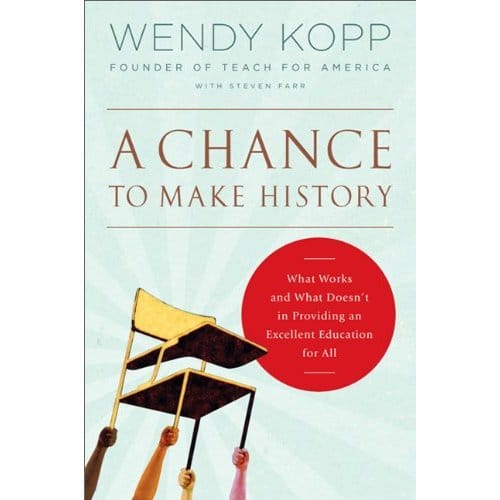 On the twentieth anniversary of Teach for
America, founder Wendy Kopp (with some help from Teaching As Leadership author Steven
Farr) reflects on lessons from TFA teachers and alums about what it takes to
lift achievement for low-income kids. Despite an over-abundance of TFA lingo
and countless anecdotes that—while inspiring—are redundant, formulaic, and
idealized, the book makes several compelling arguments. Most notably, TFA
teachers and alums have shown that it’s possible to significantly lift
performance of low-income students. Kopp goes on to offer candid perspectives
on funding, school choice, class-size reduction, technology, and even “heroic
teaching”—noting that not one of these education-reform bullets is silver.
Unfortunately, she also leaves some important questions unanswered. Though the
book articulates the need for more effective teachers, it doesn’t address the
supply-side of the talent equation (i.e., how to attract better teachers to the
profession other than through
alternative certification). Sure, the book hails success stories from
high-performing charter management groups (KIPP, YES Prep), whole cities (New
Orleans, NYC, D.C.), and other innovative models (School of One, Rocketship
Education), but for those not living in dynamic hubs of educational innovation
and able to cultivate such talent-dependent reforms, the book’s lack of
tangible policy recommendations is discouraging. Kopp calls for ways to
increase the pace of change—including fostering political leadership and
advocacy infrastructure—but skims over political and policy barriers affecting
these initiatives. While there’s much to like about the book’s inspiring,
can-do attitude, it doesn’t go far enough in providing the real-world advice
that policymakers need.
On the twentieth anniversary of Teach for
America, founder Wendy Kopp (with some help from Teaching As Leadership author Steven
Farr) reflects on lessons from TFA teachers and alums about what it takes to
lift achievement for low-income kids. Despite an over-abundance of TFA lingo
and countless anecdotes that—while inspiring—are redundant, formulaic, and
idealized, the book makes several compelling arguments. Most notably, TFA
teachers and alums have shown that it’s possible to significantly lift
performance of low-income students. Kopp goes on to offer candid perspectives
on funding, school choice, class-size reduction, technology, and even “heroic
teaching”—noting that not one of these education-reform bullets is silver.
Unfortunately, she also leaves some important questions unanswered. Though the
book articulates the need for more effective teachers, it doesn’t address the
supply-side of the talent equation (i.e., how to attract better teachers to the
profession other than through
alternative certification). Sure, the book hails success stories from
high-performing charter management groups (KIPP, YES Prep), whole cities (New
Orleans, NYC, D.C.), and other innovative models (School of One, Rocketship
Education), but for those not living in dynamic hubs of educational innovation
and able to cultivate such talent-dependent reforms, the book’s lack of
tangible policy recommendations is discouraging. Kopp calls for ways to
increase the pace of change—including fostering political leadership and
advocacy infrastructure—but skims over political and policy barriers affecting
these initiatives. While there’s much to like about the book’s inspiring,
can-do attitude, it doesn’t go far enough in providing the real-world advice
that policymakers need.
|
Wendy Kopp with Steven Farr, A Chance to Make History: What Works and What Doesn’t in Providing an Excellent Education for All, (New York, NY: PublicAffairs Books, 2011). |